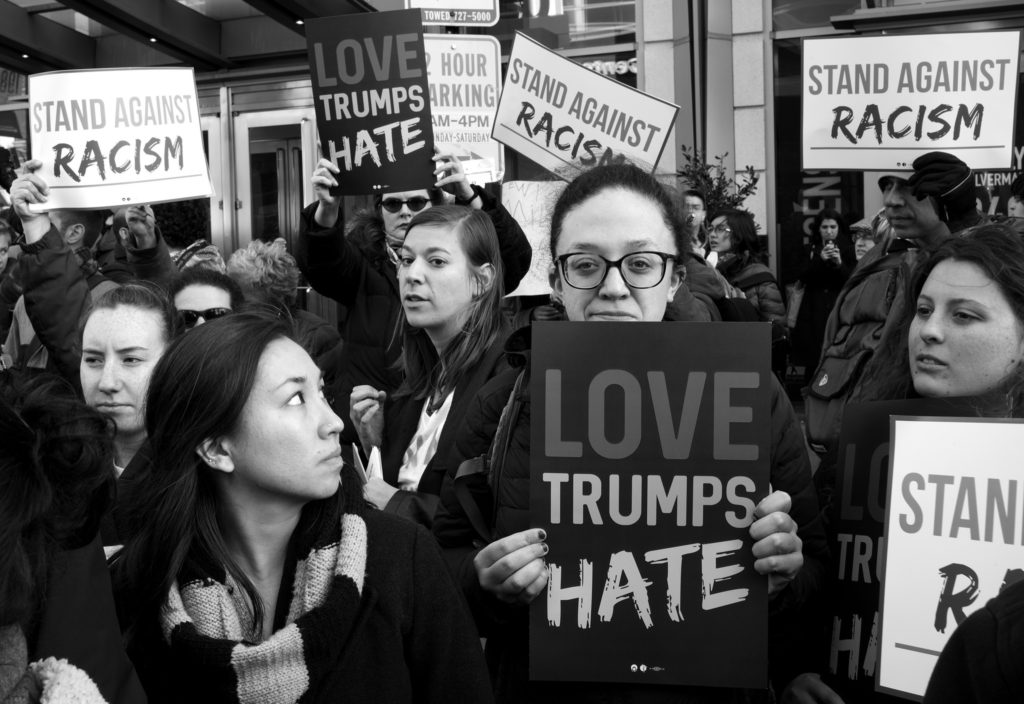Originally published at MintPress News.
AUSTIN, Texas — Donald Trump is known for voicing his negative opinions of the media, and the Republican nominee’s supporters are increasingly reflecting those sentiments with bizarre and sometimes threatening behavior toward reporters covering his rallies.
Hillary Clinton also has a history of attacking press freedom, though more through supporting the prosecution of whistleblowers and backing repressive Middle Eastern regimes than through the kind of open contempt expressed by her opponent.
‘I’m running against the crooked media’
“I’m not running against Crooked Hillary, I’m running against the crooked media,” Trump declared at an Aug. 13 rally in Fairfield, Connecticut, according to The Hill.
“That’s what I’m running against,” he reiterated. “I’m not running against Crooked Hillary.”
Another @realDonaldTrump supporter tonight screaming at reporters. This time during pre-programming pic.twitter.com/ZzjtMFB4kF
— Jeremy Diamond (@JDiamond1) August 24, 2016
Although journalists have faced violence, have been banned from his rallies, and are usually confined to a “press pen,” unable to move freely through the venues where he speaks, “they are increasingly being insulted and harassed by crowd members as Trump sharpens his animus against a media that he believes is deliberately hamstringing his run for the White House,” reported David Ferguson.
Ferguson’s Aug. 13 report for Raw Story summarizes several incidents involving the press, from NBC reporter Katy Tur, who had to be escorted by the Secret Service to safety in December, to CBS News reporter Sopan Deb, who tweeted about multiple incidents of harassment at the Fairfield rally.
https://twitter.com/SopanDeb/status/764630799652102144
If elected, Trump has promised to weaken First Amendment protections that make it difficult to sue journalists for libel, according to a report from The Associated Press. During a Feb. 26 appearance on in Fort Worth, Texas, he said he would change the law so that when reporters “write purposely negative and horrible and false articles, we can sue them and win lots of money.”
Press freedom suffers under Clinton, too
While Trump has threatened journalists and whistleblowers alike, Clinton has participated in an administration that has prosecuted and imprisoned whistleblowers at record-breaking rates. She also helped funnel military aid and other support to repressive regimes known for oppressing the press.
In 2011, Clinton defended the prosecution of whistleblower Chelsea Manning, who was charged with the capital offense of leaking thousands of files revealing military misconduct, including the murder of Reuters journalists by U.S. Army helicopters, saying:
I think that in an age where so much information is flying through cyberspace, we all have to be aware of the fact that some information which is sensitive, which does affect the security of individuals and relationships, deserves to be protected and we will continue to take necessary steps to do so.
Manning was sentenced in August 2013 to 35 years in a men’s military prison at Fort Leavenworth, Kansas, where she’s faced mistreatment as a transgender woman and may be punished with indefinite solitary confinement after a July 5 suicide attempt.
Clinton’s also attacked whistleblowers like Edward Snowden, who revealed the mass surveillance of millions of people by the NSA, suggesting he deliberately fled to China and Russia in order to share state secrets, though he was forced to seek asylum in Russia in 2013 when the U.S. canceled his passport.
Prosecution of whistleblowers like Snowden and Manning was cited as a major factor in the United States’ low ranking on Reporters Without Borders’ annual Press Freedom Index. America placed 41st out of 180 countries in 2016.
And as secretary of state, Clinton helped funnel U.S. foreign aid and military equipment to repressive regimes like Saudi Arabia, Egypt and Bahrain — all of which have histories of brutal media crackdowns.
Clinton is also outspoken in her support for apartheid Israel, despite that nation’s bloody history of murdering and imprisoning journalists. She’s even promised to crack down on American activists who support the Boycott, Divestment and Sanctions movement, even though their activity is also protected free speech.

White House correspondents demand ‘greater access’ to the next president
Not unlike Trump, Clinton’s also alienated many reporters who perceive that she dodges questions and avoids press conferences. In an analysis for New Republic on Thursday, Brian Beutler suggested the relationship between Clinton and the media is irreparably broken.
“There is a cyclical, chicken-egg like quality to the dysfunction,” he wrote, “where Clinton’s distrust of the press invites added scrutiny, which at times proves unwarranted, and thus breeds more distrust.”
Carol E. Lee, outgoing president of the White House Correspondents Association, and Jeff Mason, the incoming president, noted in a July 14 editorial for USA Today that both candidates had threatened press freedom and restricted media access to their campaigns. They criticized these actions, advocating for transparency as crucial for a well-informed electorate and healthy democracy.
“With that goal in mind, we advocate day-in and day-out at the White House for greater access to the president,” Lee and Mason wrote. “We will continue to advocate for more access during this presidential campaign.”
The pair added:
The American people expect that anyone who seeks the highest office in the United States should be put under intense scrutiny. If he or she has an issue with that, Americans should take note.